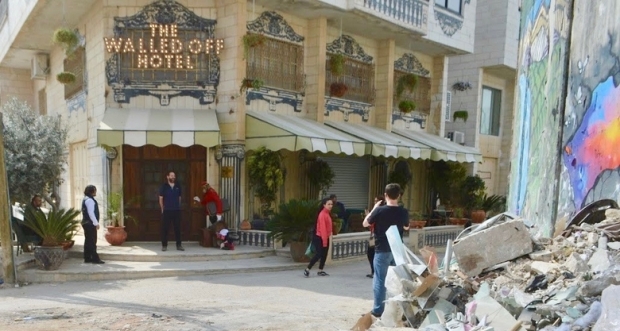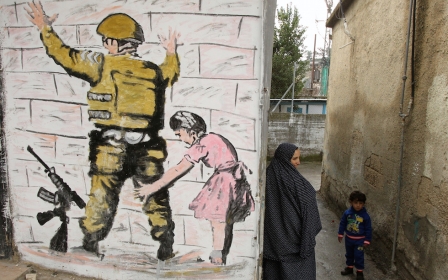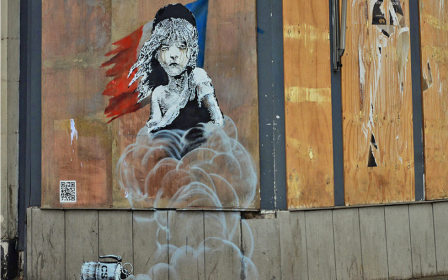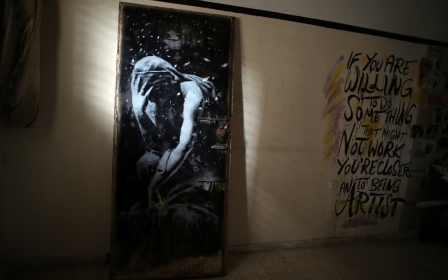Banksy's West Bank hotel causes anger among some Palestinians
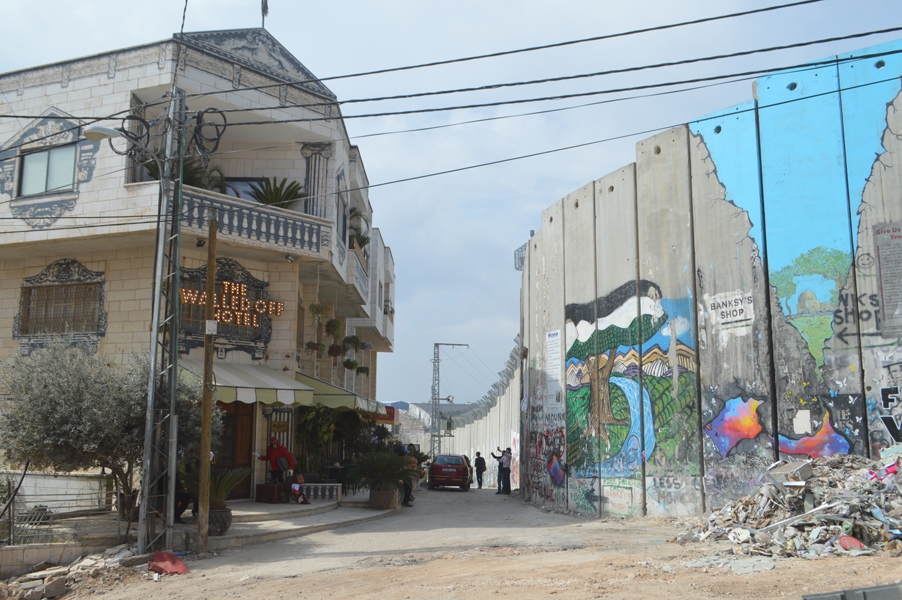
BETHLEHEM, West Bank - When Banky’s Walled Off Hotel made itself known in Bethlehem, the news spread quickly. While the hotel seemed to garner praise internationally, some Palestinians quickly took to criticising the artist’s latest stunt as a "normalisation" project that supports conflict tourism.
Suspicions of the project, which is backed by UK-based graffiti artist Banksy, centres primarily around the project’s lack of transparency. The international community and Palestinians learned of the hotel's existence together as the hotel's developers kept the project secret until the big reveal.
No one seems to know where the profits from the hotel will go, or if developers had to get permission from Israeli authorities to make renovations for such a controversial project in the administrative region of the West Bank known as Area C, where on average only 1.5 percent of all Palestinian building permit requests are approved, according to the UN.
On the hotel's website, developers addressed the question of whether the hotel is "making a profit off of other people’s misery," but they assured guests not to worry, as "Banksy won't see a penny".
"The artist paid for the installation costs and has now handed it over as an independent local business. The aim is to break even and put any profits back into local projects," the website reads.
Locals critical of the hotel are not convinced, telling Middle East Eye that the explanation is vague and complaining that the artist, known for secrecy, is not being up front about the financial aspect of the hotel's business model.
One hospitality manager in Bethlehem, who asked to remain anonymous, told MEE that he had heard rumours about the hotel's finances.
"There's absolutely something weird about the hotel. I know someone who works there and they're paying their employees three and four times more than the normal salaries for people working in hospitality, and we want to know where the money is coming from, first thing, and also, where it is going," he said.
The day before the grand opening of the hotel, tourists and journalists lingered outside, taking photos of the exterior, but were refused entry. Staff and management at the hotel declined to speak to MEE about the criticism the hotel has faced from the local community.
"Anyone can come back tomorrow and come inside; today no," one security guard answered repeatedly to any questions asked.
'Worst view in the world'
Situated mere metres from a section of Israel’s separation wall, the hotel boasts it has "the worst view in the world".
A point of major contention lies in the sign posted at the entrance of the hotel, which reads:
"You made it! Welcome to the West Bank – a place steeped in history and conflict. Now might seem a good time to pick a side – except don't. The Wall is a lie. It sells the idea there is a simple divide between the people here, but there isn't. Most Palestinians live in great disadvantage to their neighbors. Many Israelis are opposed to the cruelties inflicted by the wall, but other Israelis are deeply fearful for their security. This exhibition looks at the wall from many angles, and so contains material some people may find upsetting."
Amjad al-Qaisi, an adviser at Al Haq Center for Applied International Law, told MEE that, at best, the hotel supports "normalisation" and trivialises the plight of Palestinians everywhere.
This whole idea of let's drink coffee or have a beer together that the hotel seems to be suggesting doesn't reflect at all the situation on the ground
- Amjad Al Qaisi, Al Haq Center for Applied International Law
"At first I thought it was a nice idea that would shed some light on the wall, occupation and the human rights violations connected to it, but then I saw that sign and it really disgusted me," said Qaisi, who is also a member of the Legal Support Network of BADIL Resource Center for Palestinian Residency and Refugee Rights.
"This whole notion of 'many Israelis' being against the wall and having a problem with the wall, and this whole idea that there are two sides and both sides want peace but there are just a few extremists on each side is really problematic, and that is how this sign reads."
Qaisi said he believes other people involved in the project, including locals, should have known better, but that "unfortunately there are people looking for personal gain out of it".
"This whole idea of let's drink coffee or have a beer together that the hotel seems to be suggesting doesn't reflect at all the situation on the ground. The situation here is a brutal form of colonisation, which goes hand-in-hand with forcible displacement and the erasure of the Palestinian identity.
"In such a situation, to talk about bringing people together from both sides is so unfortunate. The biggest harm is that it feeds into the Israeli narrative and stereotypes present all over the world - when internationals come and see such a project, the first reaction of the majority of the people will be 'wow, this is such a nice project because it brings two people together who have a problem with each other for probably no real reason,' but that is such a dangerous simplification of what is going on."
'Wall Mart'
The hotel was set to open 11 March, and the second installation of the project, a gift shop called "Wall Mart," which will sell graffiti supplies to tourists wanting to put their mark on the wall, will open on 20 March.
Foreigners coming to paint the wall have long been criticised by some Palestinian activists - a fact that the hotel's website acknowledges with a bit of tongue-in-cheek.
"Some people don't agree with painting the wall and argue anything that trivialises or normalises its existence is a mistake. Then again, others welcome any attention brought to it and the ongoing situation. So in essence - you can paint it, but avoid anything normal or trivial," the website reads.
Qaisi was appalled by the idea of the graffiti shop, calling it "childish" and "naive".
"It is just really so disgusting," he said. "This whole idea that you are invited to create art on the wall. The wall is not just a wall, it's a symbol of decades-long oppression of a whole people and several generations of Palestinians that are limited and oppressed by that regime, and to just think that you go and see that wall and spray that graffiti text on it, means that you've come here to support freedom, self-determination and justice is so childish.
"It's like you can come here as an international and spray graffiti and sleep well that night thinking you did something for the world," he said. "It's so naive on one hand and harmful on the other because projects like this create obstacles for people who are actually trying to work toward justice and protection of rights."
The hotel has had two sneak peaks, where locals and tourists were allowed to go inside and take a look, one on the first day of the project's reveal and the other a few days later.
Muhannad Adaal, a Palestinian activist who visited the hotel during the first opening, told MEE that he thought the hotel could be good for Bethlehem because it could bring in more tourism and money to the city. But he also felt that people were profiting off the Israeli occupation and was concerned tourists will not walk away from the hotel with a true understanding of the conflict.
"Using the occupation for personal benefit, to make money from the hotel, is wrong," he said. "And also the general idea of the hotel is problematic. Even painting on the wall in the first place is a problem - it makes the wall look better, it turns it into art, so people are coming to see what Banksy is doing, but not seeing the actual wall.
"Since they built this hotel, the name of Banksy has taken more space than the wall itself. It shouldn't just be about the view of the wall from the hotel, it should tell more stories about the wall and how it has affected people's lives."
Using the occupation for personal benefit, to make money from the hotel is wrong
- Muhannad Adaal, Palestinian activist
Other activists are upset that Banksy and his projects are not supporting the Boycott, Divest and Sanctions movement, because of his previous works, and the invitations to musicians who have played in Israel before.
The Banksy website had previously featured an event on 13 March featuring DJ Fatboy Slim. The website said the show was cancelled due to road construction, but several activists told MEE that because of the DJ’s previous shows in Tel Aviv, the hotel was warned that demonstrators would shut down any event that featured the artist.
"It looks like Banksy doesn’t understand what the boycott means or doesn't support it, and BDS is one of our main struggles. If he really supported Palestinians he would stand with them, and not allow artists that are against BDS to come here," Adaal said.
"And then to have these signs talking about letting Israelis and Palestinians come to the hotel together is messed up. I love any idea of peace, but it has to be built on justice first. We can't open our hotels and houses to Israelis to come here easily and normalize the situation before we actually work on the steps that come before that.
"Until there is a real movement toward peace, Israelis can see the wall from the other side if they want," he said. "They don’t have to come here."
This article is available in French on Middle East Eye French edition.
Middle East Eye propose une couverture et une analyse indépendantes et incomparables du Moyen-Orient, de l’Afrique du Nord et d’autres régions du monde. Pour en savoir plus sur la reprise de ce contenu et les frais qui s’appliquent, veuillez remplir ce formulaire [en anglais]. Pour en savoir plus sur MEE, cliquez ici [en anglais].


